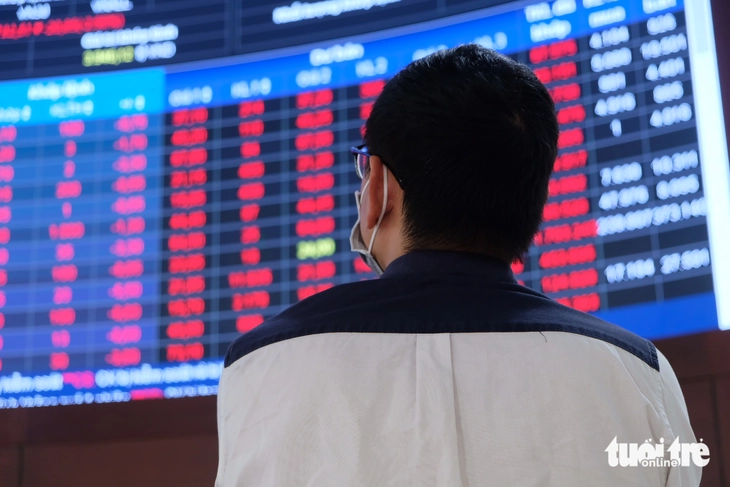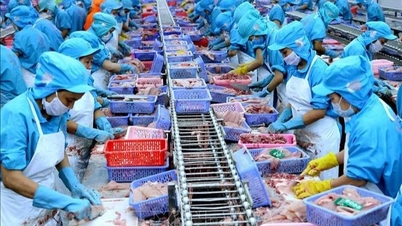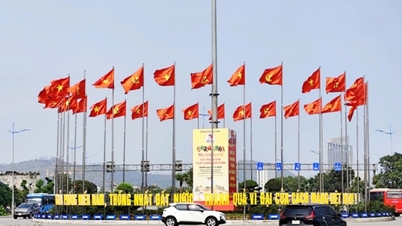
The stock market plunge makes investors worried and lose their composure - Photo: BONG MAI
Reflecting the panic that took place in the Vietnamese stock market, after President Donald Trump announced that Vietnam would be subject to a reciprocal tax of up to 46%, among the top countries with the highest reciprocal tax imposed by the US.
Shocked, no appetite after seeing stock market drop to record low
As soon as the trading session started today, April 3, red immediately flooded the stock market. The selling pressure spread so strongly that a series of codes could not stay in red, quickly falling to the floor price with light blue.
In the afternoon session, the situation became more tense, the market was "added fuel to the fire", stocks continued to be sold more aggressively. VN-Index quickly fell more than 88 points (-6.6%) to 1,229 points, then continued to fluctuate strongly.
Thus, the history of the Vietnamese stock market has just witnessed a record decline in a trading session, the VN-Index fluctuated strongly and fell deeper than during the COVID-19 pandemic.
"The stock market has only been on the shore for about a month now, and now it has suddenly dropped shockingly. I don't want to eat or drink anything anymore," said Mr. Thanh Tien (investor, Ho Chi Minh City).
Famous for the title "stock market beauty queen", Miss Mai Phuong Thuy also posted on her personal page a photo of a trading session highlighted with two main colors: fiery red - light blue, with the exclamation: Oh my god, it's been a long time since I looked at the board.
During the session, stocks that put great pressure on the VN-Index to plummet included: VCB (Vietcombank), BID (BIDV), CTG (Vietinbank), TCB (Techcombank), VIC (Vingroup), FPT, VHM (Vinhomes), HPG (Hoa Phat), GAS (PetroVietnam Gas), MBB (MBBank)...
Despite the increase in gold prices, PNJ shares (the only company in the gold and silver industry listed on the stock exchange) were also sold off and hit the floor.
By business sector, the industries that have seen sharp declines include: telecommunications, transportation, energy, financial services, distribution - retail of durable goods, software, consumer goods - decoration, household - personal appliances, insurance, credit institutions, specialized - commercial services, raw materials, food - beverages, tobacco, real estate, etc.
Should you run away or stay in the stock market?
Keeping a close eye on market developments, Mr. Nguyen The Minh - Director of Research and Development for Individual Clients at Yuanta Vietnam Securities, shared with Tuoi Tre Online that the Vietnamese stock market has witnessed notable declines. However, the sharp decline of today's session is even more intense than the COVID-19 pandemic and the fluctuations of 2022.
Through experience, Mr. Minh acknowledged: "Panic and selling like this is not beneficial, nor is it good for your own assets. The most important thing is that investors must evaluate the problem, see their current position, and calculate whether they really have to "run away" or should continue to stay in the market."
Strategically, investors using high financial leverage (margin) should consider lowering it to avoid being triggered by short selling, which would make losses worse. If the cash balance is still high, it is possible to consider buying exploration with a low proportion, depending on the risk appetite in the investment.
Regarding the sectors affected by the US tax policy, Mr. Minh said that electronic components are ranked at the top. However, this group mostly belongs to foreign-invested enterprises (FDI).
Meanwhile, Vietnamese enterprises in the wood, footwear, seafood (especially shrimp) industries... are negatively affected by the tax. Many other industries, although not directly affected, are also affected, typically among them is banking.
Many experts also emphasized that in the near future, there may be a situation where securities companies make margin calls, activating "short selling" of stocks of customers who have reached the dangerous threshold, to help securities companies limit the loss of capital that has been lent to customers.
This development will also affect the general market. Investors need to follow closely the developments to promptly come up with appropriate solutions.
Source: https://tuoitre.vn/chung-khoan-giam-ky-luc-gioi-dau-tu-xanh-mat-khong-thiet-an-uong-20250403105303175.htm


![[Photo] Nghe An: Bustling atmosphere celebrating the 50th anniversary of Southern Liberation and National Reunification Day](https://vphoto.vietnam.vn/thumb/1200x675/vietnam/resource/IMAGE/2025/4/29/64f2981da7bb4b0eb1940aa64034e6a7)
![[Photo] Ho Chi Minh City residents "stay up all night" waiting for the April 30th celebration](https://vphoto.vietnam.vn/thumb/1200x675/vietnam/resource/IMAGE/2025/4/30/560e44ae9dad47669cbc4415766deccf)
![[Photo] Ho Chi Minh City: People are willing to stay up all night to watch the parade](https://vphoto.vietnam.vn/thumb/1200x675/vietnam/resource/IMAGE/2025/4/29/cf71fdfd4d814022ac35377a7f34dfd1)
![[Photo] General Secretary attends special art program "Spring of Unification"](https://vphoto.vietnam.vn/thumb/1200x675/vietnam/resource/IMAGE/2025/4/29/e90c8902ae5c4958b79e26b20700a980)
![[Photo] Hanoi is brightly decorated to celebrate the 50th anniversary of National Reunification Day](https://vphoto.vietnam.vn/thumb/1200x675/vietnam/resource/IMAGE/2025/4/29/ad75eff9e4e14ac2af4e6636843a6b53)

















![[Photo] Prime Minister Pham Minh Chinh meets to prepare for negotiations with the United States](https://vphoto.vietnam.vn/thumb/1200x675/vietnam/resource/IMAGE/2025/4/29/76e3106b9a114f37a2905bc41df55f48)

































































Comment (0)